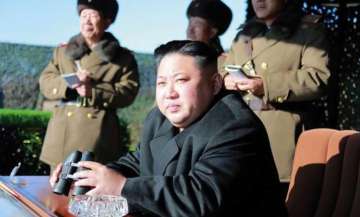The UN Security Council unanimously approved tough new sanctions against North Korea on Friday in response to its latest launch of a ballistic missile that Pyongyang says is capable of reaching anywhere on the US mainland.
The resolution adopted by the council includes sharply lower limits on North Korea's refined oil imports, the return home of all North Koreans working overseas within 24 months, and a crackdown on ships smuggling banned items including coal and oil to and from the country.
But the resolution doesn't include even harsher measures sought by the Trump administration that would ban all oil imports and freeze international assets of the government and its leader, Kim Jong Un.
The resolution, drafted by the United States and negotiated with the North's closest ally China, drew criticism from Russia for the short time the 13 other council nations had to consider the draft, and last-minute changes to the text. Two of those changes were extending the deadline for North Korean workers to return home from 12 months to 24 months - which Russia said was the minimum needed - and reducing the number of North Koreans being put on the UN sanctions blacklist from 19 to 15.
US Ambassador Nikki Haley said after the vote that "the unity this council has shown in leveling these unprecedented sanctions is a reflection of the international outrage at the Kim regime's actions."
The Security Council has stood united for the 10th time "against a North Korean regime that rejects the pursuit of peace," she said.
President Donald Trump tweeted the 15-0 vote, adding: "The World wants Peace, not Death!"
China's deputy UN ambassador, Wu Haitao, said it's "imperative" to pursue a peaceful settlement and resume dialogue and negotiations at an early date, warning that resorting to force "will only lead to disastrous consequences."
Deputy Russian Ambassador Vladimir Safronkov also demanded that key parties display "openness to genuine, meaningful political dialogue." Stressing the importance of "creative approaches," he said that "isolation and pressure must give way to dialogue and talks."
UN Secretary-General Antonio Guterres also called for a political solution, "which requires de-escalation and open communication channels now," his spokesman said.
Haley recalled that the previous sanctions resolution approved in September, when combined with earlier measures, would ban over 90 percent of North Korea's exports reported in 2016.
That resolution, adopted in response to North Korea's sixth and strongest nuclear test explosion on Sept. 3, banned North Korea from importing all natural gas liquids and condensates. It also banned all textile exports and prohibited any country from authorizing new work permits for North Korean workers - two key sources of hard currency for the northeast Asian nation.
Haley told the council Friday that the new resolution "bans all remaining categories of major North Korean exports - a loss of nearly $250 million in revenue to the regime."
Latest World News
